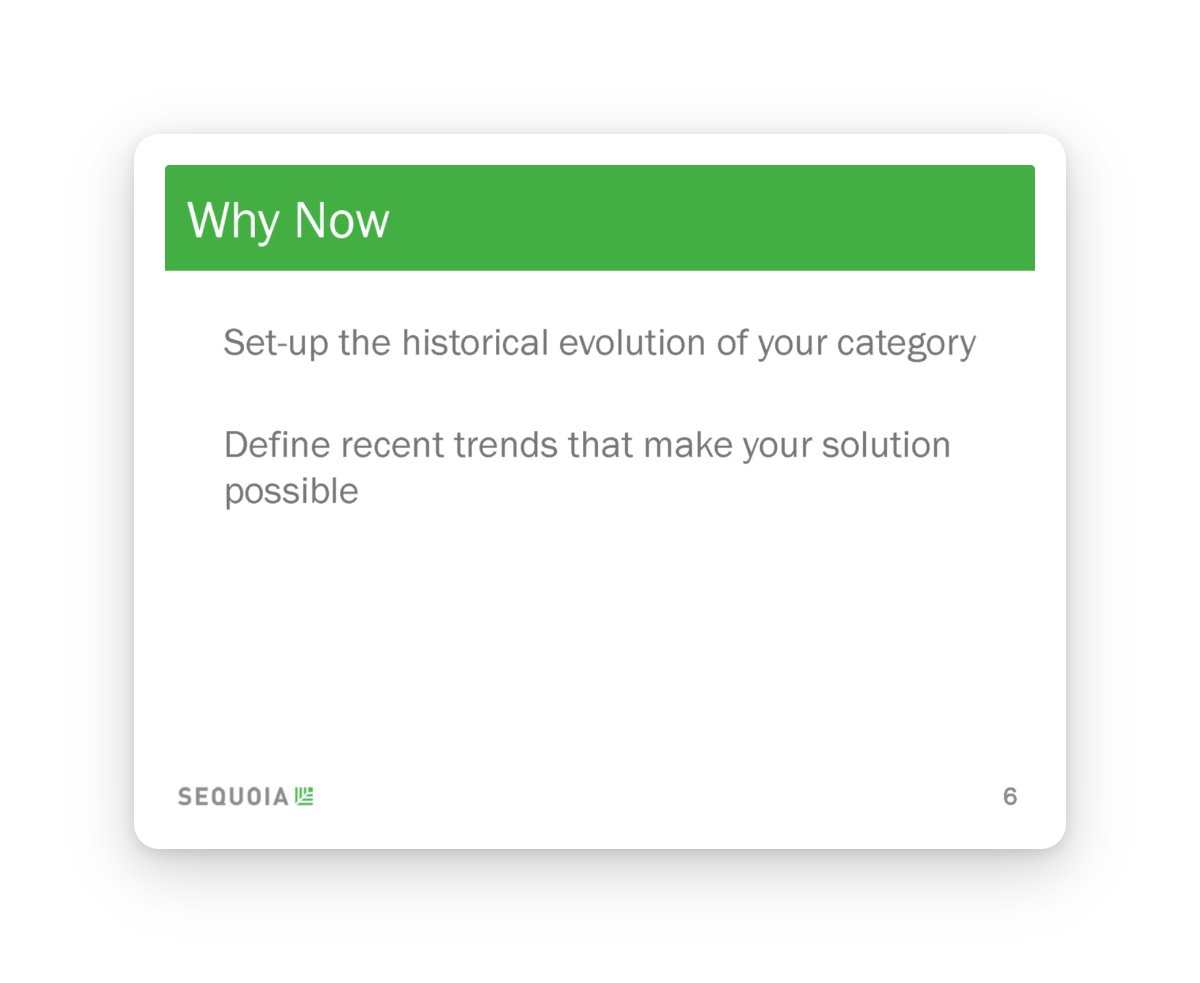Investors have a short attention span.
They will give you the most attention at the start of your pitch.
In the first 5 minutes be crystal clear about what you actually do.
Let's dive in:












10 startup metrics every business owner must know:
— Alex Banks (@thealexbanks) June 15, 2022
Sequoia Capital has created over $3.3 trillion dollars in value.
— Alex Banks (@thealexbanks) July 25, 2022
Steal their pitch deck framework for free:
An introvert's guide to elite networking.
— Kurtis Hanni (@KurtisHanni) March 8, 2022
9 tips to build a network:
The world's most powerful skill:
— Zain Kahn (@heykahn) March 12, 2022
Effective decision-making.
But colleges eat up 4 years of our lives and don't even bother teaching it.
Instead, here are 10 quick lessons from psychology that will upgrade your decision-making in the next 5 minutes:
I'm having a glass of whiskey after a long day.
— Amanda Natividad (@amandanat) March 9, 2022
Some spicy takes about life, careers, and creating:
I have worked with dozens of startup founders and hundreds of their leaders.
— Greg Moran \U0001f30e Evergreen Mountain Equity Partners (@EvergreenMEP) March 13, 2022
The biggest reason they don't achieve what they desire?
Founders hang on to leaders that can't scale.
Here are 6 ways to succeed faster by upgrading your leadership.
1/
— 10-K Diver (@10kdiver) February 5, 2022
Get a cup of coffee.
In this thread, I'll show you how to read and understand a company's Balance Sheet.
As investors, we should be able to judge businesses by looking at their financial statements.
And the Balance Sheet, of course, is 1 of 3 key financial statements: pic.twitter.com/6D0HA0vmEN
Many new investors are scared of financial statements. I don't blame them. Us accountants complicate the simplest things to keep ourselves employed\U0001f602
— Soul \U0001f4da (@SoulFairy3) December 6, 2021
Let me show you guys the Income Statement first. You honestly just need 3 numbers. Trus bob\U0001f483
Short \U0001f9f5
Accounting is the language of business.
— Brian Feroldi (\U0001f9e0,\U0001f4c8) (@BrianFeroldi) July 28, 2021
If you buy stocks, you MUST learn how to read an income statement
Here\u2019s everything you need to know:
Most founders don\u2019t understand the difference between PROFIT and CASH FLOW
— Ali Ladha (@AliTheCFO) November 2, 2021
Not knowing this difference, could leave your business without cash and push you into bankruptcy
Here are the key differences between PROFIT and CASH FLOW
//A THREAD//
I have been writing online for 10 years.
— Nicolas Cole \U0001f6a2 (@Nicolascole77) January 31, 2022
In that time, I have gone viral more times than I can count.
And accumulated 250,000,000+ views.
These are the 5 rules I live by\u2014to write things that reach the masses:
In 2021, I wrote 50+ threads for companies, founders, and my personal account.
— Brandon Zhang (@brandonthezhang) January 12, 2022
In total, they generated around 18,000,000 impressions and >70k followers.
Here are 12 Twitter content frameworks to 10x your growth in 2022:
I reached 20k followers over the weekend. It took 10 months.
— \U0001f7e3 George (@OneGSisneros) February 1, 2022
This is how I did it.
// a thread \U0001f9f5 pic.twitter.com/HEBYEv7MR6
A Twitter audience is a massive asset.
— Justin Welsh (@JustinSaaS) February 8, 2022
I've added 37,196 followers in just 14 weeks.
Here are the 7 simple things I did:
\U0001f9f5
How to Get Rich (without getting lucky):
— Naval (@naval) May 31, 2018
How to get rich without getting lucky:
— Nick Huber (@sweatystartup) September 28, 2020
Find a way to make $100 an hour doing something simple IN YOUR TOWN.
Do it until you have $10k+ in the bank and you\u2019re too busy to sell new customers.
Hire employee for $25 / hr to do what you do so you can sell new customers.
Repeat.
Early career years are painful.
— Romeen Sheth (@RomeenSheth) February 8, 2022
You feel like an idiot 98% of the time - lost, confused and insecure.
I wish I had a cheat sheet of principles for my first job.
So I put one together.
Here are 20 things about building a career I wish I knew sooner:
The first years of your career are brutal.
— Zain Kahn (@heykahn) January 25, 2022
You're on your own and you have no clue what you're doing.
I wish I had a guide back then \u2015 so I made my own.
And I went from 0 to VP in 3 years.
Here are 11 principles to accelerate your career now: